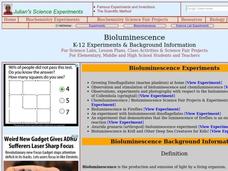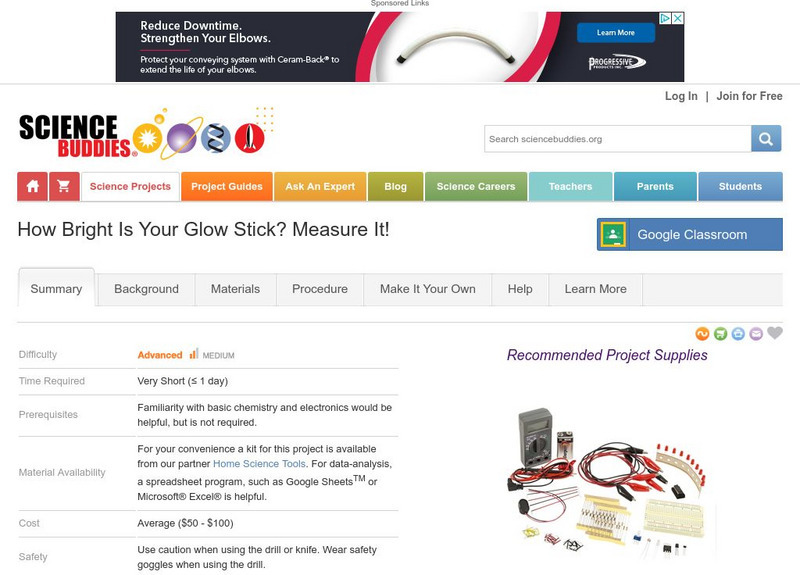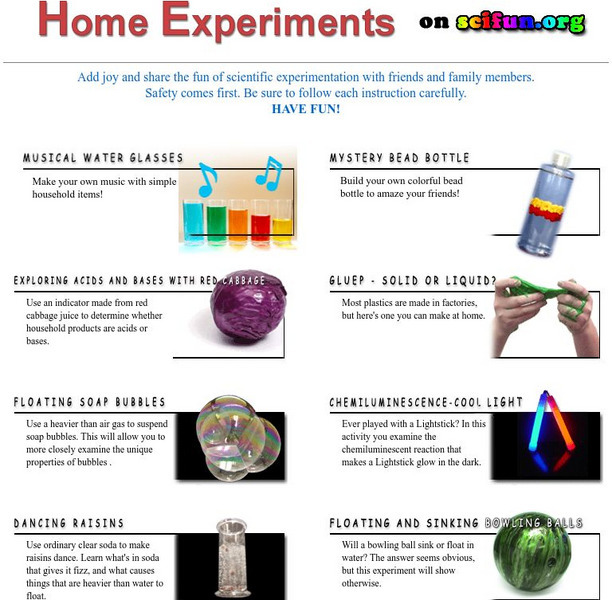Curated OER
Light Stick Chemistry
In groups of three with the lights off and the shades drawn, investigators place inactivated light sticks, in three beakers: one filled with ice water, another with lukewarm water, and the other with room temperature water. They wait...
Curated OER
Chemiluminescence
Students explore chemiluminescence through various experiments. In this chemistry instructional activity, students explain the chemical reaction that drives the process. They give real life applications of chemiluminescence.
Curated OER
Bioluminescence
Students differentiate chemiluminescence from bioluminescence. In this biology instructional activity, students explain how fireflies and other animals emit light. They discuss the applications of engineered bioluminescence.
Curated OER
Observation and Stimulation of bioluminescence and chemiluminescence
Students are introduced to chemical reactions, reaction rates, chemiluminescence, fluorescence and bioluminescence. They use glow sticks are used to demonstrate the effect of temperature on the rates of chemical reactions. Pupils recall...
Curated OER
Cool Lights
Students investigate how and why deep-sea organisms produce light. They examine how these processes can be used to study deep ocean environments.
TED Talks
Ted: Ted Ed: The Brilliance of Bioluminescence
Some lucky animals are naturally endowed with bioluminescence, or the ability to create light. Leslie Kenna investigates this magical glow and our quest to replicate it. [4:09]
Sam Houston State University
Sam Houston State University: Chemiluminescence
Chemiluminescence is explained with QuickTime and Flash movies. Features links to resources for both higher grades and younger students.
Science Buddies
Science Buddies: How Bright Is Your Glow Stick? Measure It!
Objects that glow in the dark hold a special place in the imagination of both children and adults. The lights go out at night, but these odd things refuse to disappear. Where does the light come from? Do they work in any climate? In this...
Science Education Resource Center at Carleton College
Serc: Who Has the Light?
This lesson explores bioluminescence. Discover which deep-sea organisms are capable of bioluminescence, and how this ability benefits these organisms. In this activity, students compare and contrast chemiluminescence, bioluminescence,...
Science is Fun
University of Wisconsin: Home Experiments
This resource presents a collection of simple science experiments kids can do using household materials. The procedures include diagrams and are simple to follow.
PBS
Pbs Teachers: Scientific American: Beneath the Sea: Light Stick Chemistry
Explore chemiluminescence and describe how the temperature of the chemicals that combine in a light stick affects the reaction. Apply that knowledge to understand bioluminescence in deep-sea marine life.












